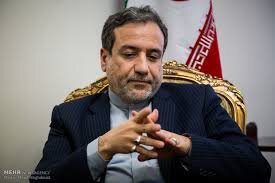Assassination of Iranian hero activates end of U.S. presence in region: Araghchi

TEHRAN - The Iranian deputy foreign minister on Saturday reacted to the U.S. assassination threat against an Iranian military commander, noting that the assassination of General Qassem Soleimani, the commander of IRGC Quds Force, has activated the end of the U.S. military presence in the region.
“Assassination of our heroes by the U.S. state terrorism began termination of the U.S. presence in the region,” Abbas Araghchi wrote on his official Twitter account.
According to the BBC, huge crowds took to the streets of Iraq's capital, Baghdad, to demand that U.S. forces leave Iraq.
Many carried Iraq's national flags as well as placards denouncing the U.S. military presence in Iraq.
"Death to America!" demonstrators chanted, and some carried a cardboard cut-out of U.S. President Donald Trump.
On January 5, the Iraqi parliament adopted a resolution asking the government to demand the pullout of U.S. troops from Iraq.
The parliamentary approval and huge demonstrations followed the assassination of General Soleimani and Iraq’s PMU deputy leader Abu Mahdi al-Muhandis in a U.S. air raid near Baghdad’s airport on January 3.
“Now, the unexperienced people in the U.S. State Department are so blind that they can’t see widespread rallies and they are threatening another (Iranian) General,” Araqchi added.
Following the assassination of Soleimani, Leader of the Islamic Revolution Ayatollah Ali Khamenei appointed Brigadier General Esmail Ghaani as the new commander of the IRGC Quds Force.
Ghaani had been deputy commander of the Quds Force since 1997.
In reaction to the U.S. threat of assassinating the new commander of the Quds Force, Araghchi added, “The maximum pressure is definitely a great failure (for the White House), but the extremists who rule over the White House do not know anything about Iran and insist on continuation of their path.”
U.S. Special Representative for Iran Brian Hook, in an interview with the Saudi-owned Asharq al-Awsat newspaper on Thursday, made assassination threats against General Ghaani.
“If (Ghaani) follows a similar path of killing Americans, he will meet the same fate, because the President (Trump) has made clear for years that any attacks against the American personnel or interests in the region will be met with a decisive response, and the President demonstrated that on January 2nd. So this is not a new threat,” Hook said.
On Thursday, Iranian Foreign Ministry spokesman Abbas Mousavi said the United States officially unveiled “targeted and state terrorism” by threatening to assassinate the new commander of the IRGC Quds Force.
Mousavi said, “Now, after the Zionist regime, the United States is the second regime which has officially announced using its government possibilities and armed forces to take terrorist action.”
The U.S. resort to terrorist actions shows Washington’s “weakness and frustration” and also “confusion” among its officials, the ministry spokesman said.
He also urged the international community to condemn state terrorism, because “the continuation of this trend would sooner or later befall everyone.”
On Thursday, Russian Foreign Ministry spokeswoman Maria Zakharova also condemned the U.S. threats to assassinate Gha’ani as “unacceptable.”
“I state once again that such statements are unacceptable for us. Such remarks have been made beyond rights and law, and representatives of world states are not entitled to utter them,” the Arabic service of Russia’s Sputnik news agency quoted Zakharova as saying at a news briefing in the capital Moscow.
MJ/PA
